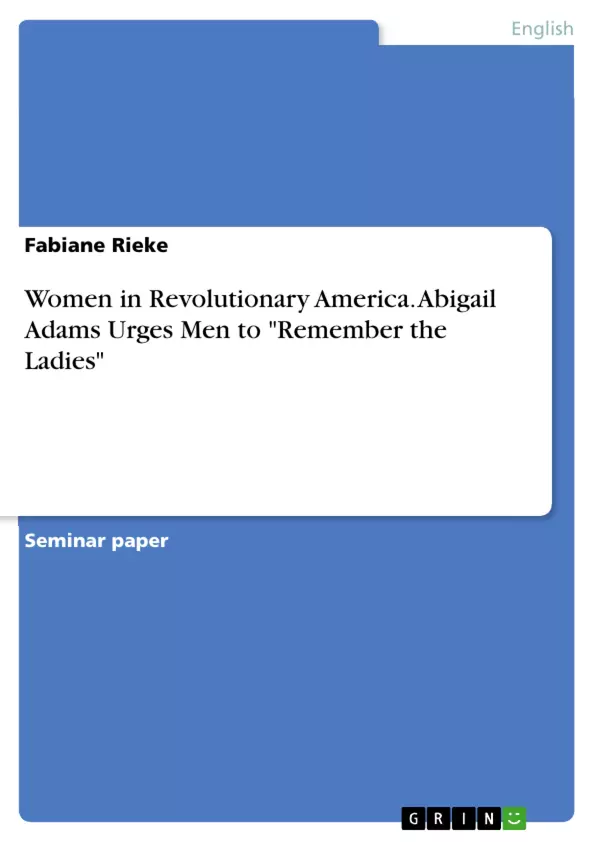Women of the eighteenth century took actions and thereby got the possibility to shortly dive into the public world. Especially literature, including the genre of the letter, seemed to have “blurred the lines between public and private”. Since correspondences were, like women, associated with the private sector, it was allowed to communicate through them and therefore they enabled women to approach the public sphere in a way. Thus, many women made use of this means to criticize the lack of equal rights while simultaneously performing their expected role of womanhood in the eighteenth century. One of these women was Abigail Adams, who mentioned in a letter to her husband in 1775: “My pen is always freer than my tongue” (Ellis 2).Adams fulfilled her conservative duties while she was longing for equality at the same time. How did she finally succeed in voicing her discontent in a patriarchal state?
Before concentrating on this question, based on correspondences of the year 1776, called “Remember the Ladies”, the general image of Womanhood in the historical and political development will be outlined including female approaches to the public sphere as well. Considering this historical context, the third part of the paper will illustrate the function of the genre of letters. Finally, a thorough analysis of Abigail Adam´s letters will be provided in the fourth part of the paper, which will point out in how far letter writing helps to successfully put forward her arguments.
Table of Contents
- Introduction
- Womanhood in the Revolutionary Days
- Women and Letter Writing
- “Remember the Ladies” -Abigail Adam's Letters in Revolutionary Days
- Conclusion
Objectives and Key Themes
This paper examines the role of women in Revolutionary America, particularly focusing on Abigail Adams's letters and her efforts to advocate for women's rights during a period of significant societal and political change. It explores how women navigated the public sphere, despite the limitations imposed by a patriarchal society, and utilized the medium of letter writing to express their concerns and aspirations.
- The evolving image of womanhood in Revolutionary America.
- The limitations and opportunities women faced in the public sphere.
- The role of letter writing as a means of communication and political expression.
- Abigail Adams's use of letter writing to advocate for women's rights.
- The impact of women's contributions on the development of American society.
Chapter Summaries
- The introduction sets the historical context, exploring how Enlightenment ideals influenced the American Revolution and how women were excluded from the newly established "natural laws," despite their desire for equal rights.
- The second chapter delves into the traditional image of womanhood in Pre-Revolutionary America, highlighting the rigid ideological characteristics attributed to women, rooted in Greek explanations. It also examines the ways women navigated their roles as wives, mothers, and community members.
- The third chapter explores the role of letter writing as a means of communication and expression for women in the eighteenth century, demonstrating how this genre allowed them to bridge the gap between the private and public spheres.
- The fourth chapter focuses on the letters of Abigail Adams, highlighting her use of this medium to voice her discontent with the lack of equal rights. This analysis explores how she managed to express her arguments within a patriarchal state while fulfilling her expected social roles.
Keywords
The key concepts explored in this paper include: Revolutionary America, women's rights, letter writing, public sphere, private sphere, Abigail Adams, "Remember the Ladies," Enlightenment ideals, Republican Motherhood, and the evolving image of womanhood.
Frequently Asked Questions
Who was Abigail Adams and why is she significant?
Abigail Adams was the wife of John Adams (the second U.S. President). She is significant for her advocacy for women's rights and her intellectual influence during the American Revolution, famously urging her husband to "Remember the Ladies."
What does the phrase "Remember the Ladies" refer to?
It refers to a famous letter Abigail Adams wrote to John Adams in 1776, asking him and the Continental Congress to consider women's rights and legal protection when drafting new laws for the independent nation.
Why was letter writing important for women in the 18th century?
Letter writing allowed women to "blur the lines" between the private and public spheres, providing a socially acceptable way to express political views and criticize social inequalities within a patriarchal society.
What was the concept of "Republican Motherhood"?
It was an ideology that emerged after the Revolution, suggesting that women had a vital political role in educating their sons to become virtuous citizens of the new republic.
How did Enlightenment ideals affect women during the American Revolution?
While Enlightenment ideals preached "natural laws" and equality, they were initially applied almost exclusively to men, leading women like Abigail Adams to challenge this exclusion.
- Quote paper
- Fabiane Rieke (Author), 2011, Women in Revolutionary America. Abigail Adams Urges Men to "Remember the Ladies", Munich, GRIN Verlag, https://www.grin.com/document/1170503



